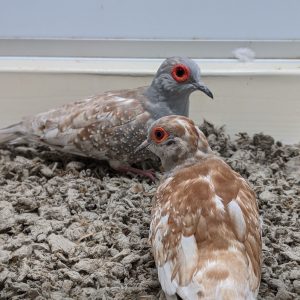Diamond Doves
Diamond Doves are calm, mostly quiet birds with an attractive appearance that may appeal to the bird fancier with spatial or environmental needs necessitating a less vocal companion. With a lifespan of up to 10 years, Diamond Doves are a great choice for a longer-term pair of companions. Although these birds are generally considered “hands-off” pets due to preferring their own kind over human interaction, it presents the keeper an opportunity to keep a male and female pair and observe interesting social behaviors. Additionally, they are exceptionally easy to breed which makes them a great choice for the individual looking to keep and raise birds as a hobby. In nature these birds are found in arid environments within their native country of Australia, only a short distance of a water source. Females have a smaller eye ring, and tend to be more brown in color, whereas the males have a bold, puffy eye ring and a bluish-grey head. They are petite- only about the size of a lovebird as compared to other species such as ringneck doves.

Here is some basic information on the day-to-day maintenance for Diamond Doves.
Housing Needs
Diamond Doves are ground dwellers and travel via flight- they are unable to climb like most species of domestic birds, so a wide cage with plenty of floor room is advised to best mimic the natural living conditions they prefer. The minimum cage size for this species should be 18″x18″, however as with any flighted species, bigger is better. Bar spacing should be no more than .4 inches to prevent injury. A cage with a grate is preferable for cleanliness, with a flat (non-grated) surface for walking if the bird desires. Perches should be spaced with a fair distance between them and have varying textures and width to promote healthy feet. Doves also enjoy opportunities to bathe, either with a cage-mounted birdbath or shallow dish placed in the cage.
Food and Water
Fresh food and water should be available at all times. Doves swallow their food whole and will need to be provided with a source of bird grit to help break down their food. Appropriate feed includes a dove or pigeon specific feed or a high quality seed blend, as well as a variety of species-appropriate fresh fruit or vegetables. Food and water should be refreshed and replaced daily.
Behavior and Temperament
Diamond Doves have calm dispositions but tend to be easily frightened by their human keepers. They are very much prey animals, and sudden movements or loud noises can be startling to them. They do best in a home without predator species, such as dogs or cats. During the day, one may hear the male vocalizing softly to the female with gentle cooing and grunting. Females rarely vocalize to the degree males do. Doves do not interact with toys as much as other domestic bird species, but providing a few regardless is a good idea to prevent boredom in your birds. Doves enjoy dangling toys such as bells and swings, natural fiber toys such as seagrass or coconut, in addition to naturalistic playthings such as fresh branches with leaves (be sure to check for potential toxicity or pest risks from local plant species if using trimmings from your yard).
Diamond Doves are not keen on being handled, and do better in an environment where they can be observed quietly with minimal human contact.
Summary
The gentle, quiet nature of Diamond Doves makes them ideal for the hands-off bird enthusiast who enjoys the peaceful companionship of softbills as compared to the vivacious, rowdy behavior of other more popular hookbill bird species. They are a great way to get one’s feet wet in the world of bird husbandry without the commitment to the high noise levels and cleanup necessitated by traditional choices in pet birds. With a lifespan of up to 10 years and their relatively simple care needs, they can be enjoyed for years by bird enthusiasts of all ages.
Written by Emlyn C.
All recommendations listed here are based on the author’s personal knowledge and experience- readers are expected to cross reference and do their own due diligence in regards to animal care.
